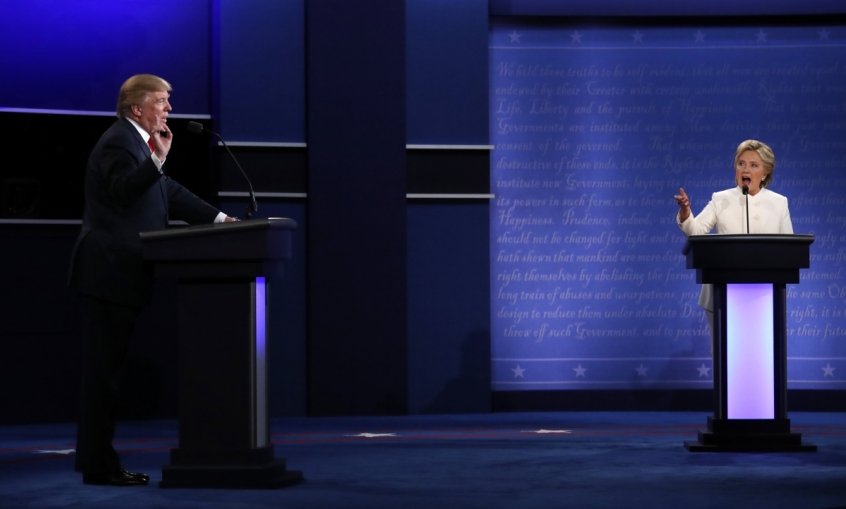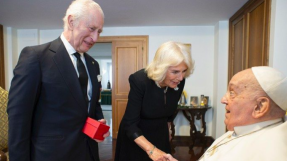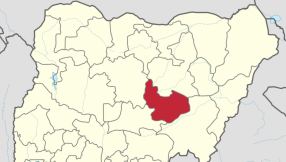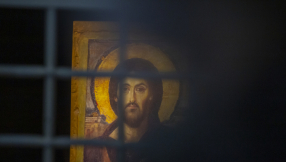
A clash over abortion rights marked the third US presidential debate on Wednesday that saw Republican Donald Trump and Democrat Hillary Clinton go head to head for the last time before November 8.
The rival candidates had a sharp but issues-based exchange on abortion, gun rights and immigration to start the 90-minute showdown.
The substantive policy discussion on the Supreme Court and the top issues it faces contrasted with the fiery personal attacks that characterised the first two debates.
Clinton promised to appoint justices who would uphold a woman's right to abortion laid out in the 1973 Roe vs Wade decision, while Trump promised to appoint what he called "pro-life" justices who would overturn the decision.
Under current law, Trump said, "You can take the baby and rip the baby out of the womb of the mother just prior to the birth of the baby."
"Honestly, nobody has business doing what I just said, doing that as late as one or two or three or four days prior to birth," Trump said.
Clinton said Trump's "scare rhetoric is just terribly unfortunate" and added: "We have come too far to have that [Roe vs Wade] turned back now."
"This is one of the worst possible choices that any woman and her family has to make and I do not believe the government should be making it," Clinton said.
Trump said he would appoint a Supreme Court justice who would protect American gun rights.
He has said in the past that Clinton wants to "essentially abolish" the Second Amendment of the US Constitution guaranteeing the right to bear arms.
Clinton said she supports gun rights, but wants additional regulations on guns, citing examples of children being hurt or killed in gun accidents. "I see no conflict between saving people's lives and defending the Second Amendment."
"Because I support the Second Amendment doesn't mean that I want people who shouldn't have guns to be able to threaten, kill or members of your family," she added.
No handshake
Clinton and Trump walked straight to their podiums when they were introduced at the University of Nevada, Las Vegas, foregoing the traditional handshake as they did at the second debate last week in St. Louis, Missouri.
Trump seeks to reverse his fading momentum in a US election that opinion polls show is tilting away from him.
The New York businessman, 70, has been damaged by several accusations he groped women – which he denies – and concerns about his claims the election will be rigged against him.
Less than two weeks ago, a video tape emerged from 2005 in which Trump can be heard openly talking about trying to seduce a married woman, which has thrown his high-profile evangelical support into jeopardy.
James Macdonald, a church pastor serving on Trump's Evangelical Executive Advisory Council, last week condemned the Republican presidential candidate as "lecherous and worthless" and Al Mohler, president of the Southern Baptist Theological Seminary, said of the tape: "It didn't look like just someone who was talking locker room talk. It looked like someone who was premeditating being a sexual predator."
Southern Baptist ethicist and theologian Wayne Grudem announced that he had reversed his support of Trump after having previously argued that voting for the Republican candidate was a "morally good choice".
"I cannot commend Trump's moral character, and I strongly urge him to withdraw from the election," Grudem said.
"There is no morally good presidential candidate in this election."
Wednesday's debate gave Trump, making his first run for elected office, perhaps his best remaining chance to sway the dwindling number of Americans who are still undecided about their vote in the November 8 election.
Clinton, a 68-year-old former secretary of state, US senator and first lady, leads in national polls and in most of the battleground states where the election will probably be decided. The debate was her opportunity to make a closing argument on why she is best suited to succeed her fellow Democrat, President Barack Obama, in the White House.
Trump's White House bid has been marked by personal squabbles and controversial comments about immigration and minorities. Most recently, he has urged supporters to patrol polling places in inner cities to prevent voter fraud.
Clinton has struggled to get past concerns about transparency raised over her use of a private email server for work communication while she was secretary of state from 2009 to 2013.
Additional reporting by Reuters.













